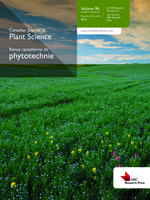Hucl, P. and Ramachandran, A. 2015. Agronomic characteristics of hard red spring wheat (Triticum aestivum L.) near-isogenic lines differing at the Waxy (Wx) locus. Can. J. Plant Sci. 95: 201-204. Null mutations of the Waxy gene in all three genomes of hexaploid wheat (Triticum aestivum L.) produce a waxy starch phenotype. The agronomic performance of 32 waxy, partially waxy and wild-type near-isogenic spring wheat lines and four check cultivars was assessed at two locations over three cropping seasons. Differences in grain yield, kernel weight and test weight among allelic groups were generally small. The results of our study suggest that no significantly negative effects are likely to occur in the commercial cultivation of partially waxy wheat lines derived from a CWRS cultivar.
How to translate text using browser tools
5 December 2014
Agronomic characteristics of hard red spring wheat (Triticum aestivum L.) near-isogenic lines differing at the Waxy (Wx) locus
Pierre Hucl,
Adithya Ramachandran
ACCESS THE FULL ARTICLE
It is not available for individual sale.
This article is only available to subscribers.
It is not available for individual sale.
It is not available for individual sale.

Canadian Journal of Plant Science
Vol. 95 • No. 2
March 2015
Vol. 95 • No. 2
March 2015
agronomic characteristics
Blé cireux
Canada Western Red Spring
caractères agronomiques
CWRS
lignées quasi isogéniques
near-isogenic lines




